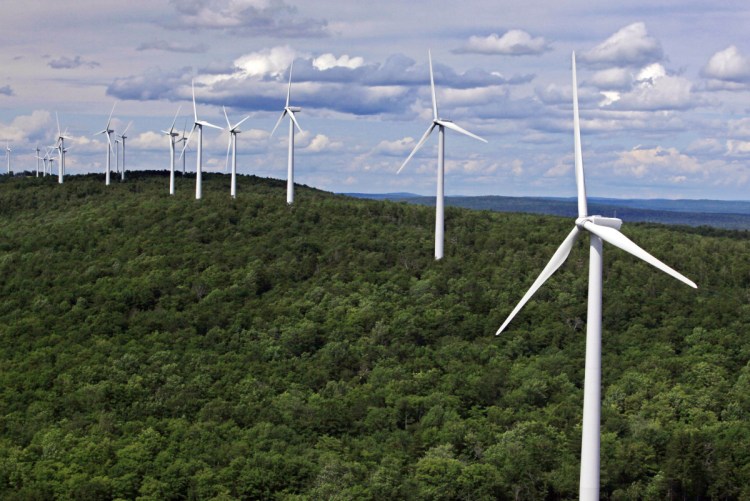AUGUSTA — Gov. Paul LePage imposed a moratorium Wednesday on new wind energy projects in western and coastal Maine while establishing a secretive commission to study how wind turbines affect the state’s tourism economy.
LePage, a longtime critic of wind energy, issued an executive order prohibiting state agencies from issuing permits “related to wind turbines” in western and coastal Maine, on coastal islands and along “significant avian migratory pathways.” The moratorium would remain in place until a new Maine Wind Energy Advisory Commission – which will have meetings that are closed to the public and not subject to Maine’s Freedom of Access Act – reports on wind power’s economic impact and recommends potential regulatory changes.
“While out-of-state interests are eager to exploit our western mountains in order to serve their political agendas, we must act judiciously to protect our natural beauty,” LePage said in a prepared statement. “I urge the commission to take the time they need to develop the right policies that balance tourism, the needs of the communities, the environment and development.”
He ordered the moratorium one day before Massachusetts regulators are expected to announce the initial round of winners of a bidding competition to supply huge amounts of renewable energy to the Bay State. With several Maine-based wind projects vying for the lucrative contract, both supporters and critics of LePage’s action said the executive order appeared timed to send a message to Massachusetts about the prospects for new wind projects in Maine.
“This is an attempt to thwart billions of dollars of investment that is looking at Maine,” Jeremy Payne, executive director of the Maine Renewable Energy Association, said in an interview. “What kind of a message are we sending to the world here when the governor is able to decide without any statutory authority to wreck a billion-dollar industry?”
Payne called LePage’s moratorium a “regulatory taking.” He was among several people who questioned its legality, even predicting a court challenge from landowners if the governor persists with the plan.
But Chris O’Neil, a consultant who often represents wind energy critics in Augusta, hopes the governor’s executive order influences the Massachusetts deliberations.
“The hope is that the selection committee interprets this as a very big stick jabbed into Big Wind’s spokes,” O’Neil said. “There are good and bad projects bidding in the (request for proposals). This news should help the folks in Boston focus on the good ones.”
A PERSISTENT CRITIC OF WIND AND SOLAR
Maine had 378 wind turbines with a maximum generation capacity of 901 megawatts last year, more than all other New England states combined and ranking Maine 21st nationally, according to a 2017 report from the American Wind Energy Association. Although development of wind energy projects has continued during LePage’s tenure, critics accuse the governor of creating an unwelcome environment for an industry that has created or supported thousands of jobs in Maine over the past decade.
In the highest-profile example, Norway-based energy giant Statoil abandoned plans to build a $120 million demonstration wind farm off the Maine coast in 2013 in response to LePage’s involvement. Two years later, Statoil announced plans to build the world’s first floating, deep-water wind farm – an estimated $228 million project – off the coast of Scotland.
The wind advisory commission also could affect the Maine Aqua Ventus project, an experimental floating wind farm off Monhegan Island that would be the first of its kind in the United States. The project is being developed by a consortium led by the University of Maine.
Attorney General Janet Mills said her office had not reviewed whether the moratorium was legal given the existing statutes regulating wind power. However, Mills also had questions about potential impacts on UMaine’s offshore wind project.
“Does it affect the major investment we have made into offshore wind power development? Because that would be a taking a major step backward if the effect of the executive order would be to hamper Maine’s research” on the technology, said Mills, a Democrat seeking her party’s nomination to succeed LePage.
LePage has been a persistent critic of the wind and solar energy industries in Maine, suggesting such renewable technologies drive up electricity costs for ratepayers and cannot compete without government subsidies.
Steve McGrath, director of the Governor’s Energy Office, said LePage would be “all in” on wind energy if it was the cheapest source of power. Instead, LePage has continuously pushed to import hydropower from neighboring Quebec. Notably, one of the proposals vying against the wind-related projects in the Massachusetts contract competition is a joint agreement between Central Maine Power Co. and HydroQuebec for a 145-mile transmission line between Canada and the Bay State.
LePage is finalizing the language of a bill that would propose changes to Maine’s controversial expedited permitting system for wind energy projects in areas of rural Maine. McGrath declined to provide specifics, but said the bill will address LePage’s concerns over impacts on tourism.
“Tourism is a major industry in the state of Maine,” McGrath said. “It attracts (many times) the state’s population … and they spend a lot of money. And if we are going to have wind turbines all over the state, we ought to know the impact cradle-to-grave of those turbines.”
POLITICAL PUSHBACK AND SOME SUPPORT
LePage’s moratorium and commission were quickly denounced by organizations and political leaders who already view Maine’s Republican governor as hostile to “green” energy.
“It’s disappointing, though unfortunately not surprising, that Gov. LePage believes he can unilaterally overrule the clear intentions of the Legislature when it comes to developing clean, renewable and job-creating energy policy in Maine,” House Speaker Sara Gideon, D-Freeport, said in a prepared statement. “I’m confident that this backward-looking executive order, in clear conflict with existing statute, would be unable to withstand legal scrutiny if, and when, challenged. In the meantime, I will continue to work with stakeholders and my colleagues in the Legislature to capitalize on Maine’s natural resources and build a clean-energy economy.”
The Natural Resources Council of Maine predicted the moratorium will not survive long, but said in the meantime, it sends a message that Maine is “Not Open for Business.”
Rep. Chellie Pingree, D-1st District, tweeted: “Instead of wasting taxpayer money studying the impact of wind turbines on Maine tourism, Governor LePage should be working to reduce the harmful affects of climate change on our state’s health, economy and environment.”
There is no dispute that commercial wind power projects can be controversial in Maine, especially among nearby landowners concerned about 400-foot-tall turbines marring their views or about the effects of vibrations and light flicker caused by spinning blades.
The Moosehead Region Futures Committee, a citizen group that has been fighting proposals for commercial wind projects near Moosehead Lake, cheered LePage’s move Wednesday.
“The moratorium by Gov. LePage is great news for the thousands of citizens and businesses who are opposed to wind development that would directly threaten the region’s vital tourism industry – the backbone of the region’s economy,” the committee’s Richard McDonald wrote in an email. “Given what’s at stake, we would expect this action to disrupt the renewable energy bidding process in Massachusetts and hopefully lead to the authorities in Massachusetts going elsewhere.”
EXEMPTION ALLOWS SECRET COMMISSION
Yet wind energy appears to have strong support among Maine residents, according to polls. And the governor’s critics also point out a disconnect between LePage claiming to want to protect the state’s “natural beauty” from wind turbines while he pushes for commercial mining in Maine and remains open to oil drilling in the North Atlantic.
LePage is using a 2009 addition to Maine’s Freedom of Access Act law to exempt his wind advisory commission from public view. Because it is exempt, the commission will not be required to release agendas, minutes or documents that guide any recommendations to change Maine’s wind power regulations.
McGrath, the energy office director, will lead the commission and help recruit the 11 to 15 individuals who will serve on it. The commissioner of the Maine Department of Economic and Community Development, George Gervais, will make the appointments to the advisory commission.
Asked about the decision to close the commission’s meetings to the public and the media, McGrath said: “The final report is really the thing that we want to speak for the commission.”
Correction: The story was updated at 11:44 a.m. on January 25, 2018 to clarify who will make appointments to the wind advisory commission.
Kevin Miller can be contacted at 791-6312 or at:
Twitter: KevinMillerPPH
Send questions/comments to the editors.





Success. Please wait for the page to reload. If the page does not reload within 5 seconds, please refresh the page.
Enter your email and password to access comments.
Hi, to comment on stories you must . This profile is in addition to your subscription and website login.
Already have a commenting profile? .
Invalid username/password.
Please check your email to confirm and complete your registration.
Only subscribers are eligible to post comments. Please subscribe or login first for digital access. Here’s why.
Use the form below to reset your password. When you've submitted your account email, we will send an email with a reset code.